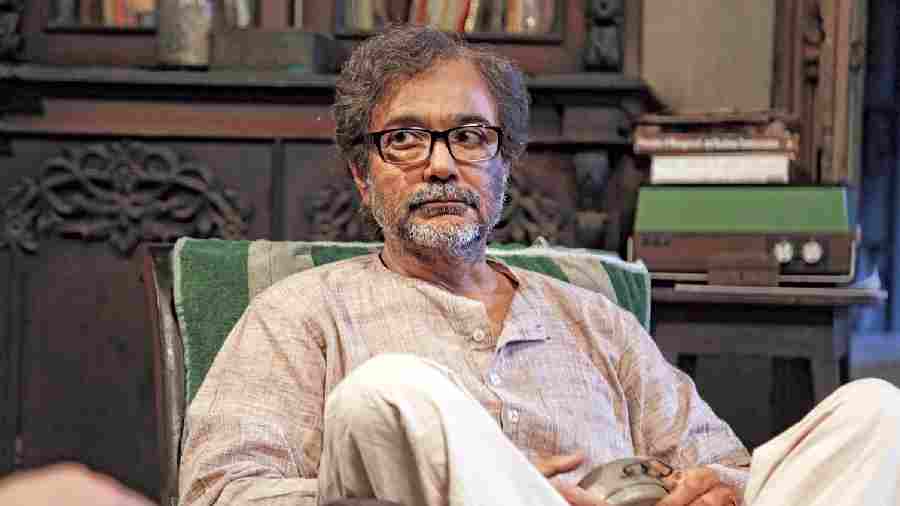In one of the most poignant scenes of Atanu Ghosh’s latest offering Shesh Pata, the wiry and weary-of-life writer Balmiki Sengupta scoffs at Medha and asks her if her happiness is solely dependent on her husband, and not on herself?! She should light the fire within and find fulfilment all on her own, he asserts, albeit bitterly. Medha is the lady appointed by a loan-recovery agent, Shounak, to act as Balmiki’s ‘pen’.
And yet, Balmiki will come to depend on Medha to “take him to Roshni”, his long-deceased wife. He will request her to sing a few lines from one of his favourite Tagore songs Amaar jawleni aalo awndhokaare, and touched by her heartfelt rendition, he will walk up to her and ‘touch’ her head, ever so gently, with his fingers. This gesture with a zillion meanings aptly brings out the dichotomy of the central character while hinting at an apparently simple and yet deliciously complex narrative.
The story is straightforward. Shounak, a loan recovery agent goes after Balmiki, a wastrel of an author who has taken a considerable advance amount to write a biography of his wife Roshni Basu, a yesteryear stage and film actress. Three decades back she was found dead in Maidan, with not a stitch on her body. That scandalous tragedy had left Balmiki scarred and bitter for the rest of his life. He has found solace in an empty nothingness, his only companions being the unadulterated hatred from his ‘Bhadralok’ neighbours, his umpteen bottles of liquor, a shapely masseuse with whom he probably has sex, and a calm little errand-boy who brings him food and fresh seasonal flowers.
Balmiki nonchalantly tells Shounak that he won’t be able to return the money since he has spent it all. Shounak gently retorts he doesn’t want the money – he needs the manuscript. Pat comes Balmiki’s reply, he won’t be able to deliver the manuscript either. Why? Because he can’t write since his hand aches, and he can’t think since his head aches! Exasperated, Shounak, a tough and yet a soft-hearted young man, gets an acquaintance of his, Medha, to write all that Balmiki dictates. Medha is an educated middle-aged lady fighting her own battles with depression and a broken marriage. What transpires hereon forms the story.
Shesh Pata is not a plot-driven narrative. It is, instead, a character study of its protagonist Balmiki and its other main characters Medha, Shounak and his girlfriend Deepa. Medha is heading for a divorce with her husband who has chosen to move out with a girl half his age. She is financially independent but needs some kind of work to keep herself engaged and fight depression. Shounak belongs to a lower-middle-class family. His father had lost his job as a respected senior film-grader when the cinema technology shifted from analog to digital. To help his family survive and to build his own future, he has taken up the job of a recovery agent, tasked with getting loans back from erring clients.
Ironically, Shounak himself has taken a loan from an acquaintance to pay for his younger brother’s higher education and is not able to return the debt. His girlfriend Deepa has her own struggles. Her father’s factory has shut down. She works at a pottery to feed her family; her younger jobless brother works for a political party and prefers playing carrom at home with friends.
The backbone of the film is, however, the conflicting journey of Balmiki Sengupta — his struggles with memories of his wife who he had once deeply loved and had yet bitterly fought with, the day she was killed. He grapples with his own ‘purposeless existence’ by trying to commit suicide and yet pulling back at the last moment. He is friendless, even hated by all. He is disgruntled and vitriolic with everyone around him, but finds joy in the flowers brought in by the small boy. He rewards the kid with five-rupee brass coins that he polishes himself. Balmiki reminisces about his past compromises with his art when he had chosen to write populist fare for films instead of artistic stories that he was originally capable of.
The layered narrative is replete with such and other intense perceptions about life, art, spirituality and the inherent interconnectedness among them. In his signature minimalist style, Atanu Ghosh aims to weave a rich tapestry about life and its debts, about life and its compromises, and finally about life and its purpose. He not only succeeds in his attempt but also achieves a rare cinematic feat through his comment on humanism.
A film is considered successful if it eventually manages to create a few memorable moments. Shesh Pata has quite a few of them. The ones involving Medha and Shounak, Shounak and his father, Deepa and Shounak, and so on, add considerable philosophical depth to the story. In a masterful scene between Balmiki and Medha, he returns in an inebriated state one night after a sudden visit to the spot in Maidan where his wife was found dead. His clothes are soiled and wet. Medha helps him change into fresh ones. The humaneness of the scene deftly combines with the embedded sexuality to whip up a winner of a moment. In another scene, the director makes a scathing attack on the prevailing political environment with the brilliantly enacted rhyme “Dhin taaker byataa tin taak / Tor Maa rnedhechhe pnuishaak / Tui ditey thaak, Aami khetey thaaki!” Anger, despair, irritation, and sarcasm are brought out with sophisticated restraint in that short moment that lights up the screen.
If the writing, by the director himself, has been a triumph, the technical departments have lent him a strong shoulder as well. The soundscape makes it so seamless and organic, that you feel you are indeed a part of Balmiki’s world. Debojyoti Mishra has come up with a background score which, in its minimalism, smoothly blends with the very appropriate sound design by Anindit Roy and Adeep Singh Manki.
The frames, compositions and lighting by veteran cinematographer Soumik Halder add heft to the visuals bringing alive the dark, dank, gloomy, and pitiful world of Balmiki. The gentle pace of the film has its origins in its writing, and editor Sujay Dutta Ray has ensured that it stays that way. The art direction by Goutam Basu has achieved what must have been a tall task — to establish the decadent world of Balmiki. Also, the spaces owned by Medha, Shounak and Deepa have that lived-in feel to them. Somnath Kundu’s detailed make-up to create the look of Balmiki Sengupta deserves all applause.
Now for the performances. Stage actress Rayati Bhattacharya looks and sounds like Deepa with utmost conviction. Perfectly cast, she makes good use of her eyes to bring forth her dilemmas and emotions. The intimate moments between the couple Shounak and Deepa seem real, aided by the perfect chemistry between the two actors. Which brings us to Vikram Chatterjee who breaks his glamorous image to become a boy next door. The actor has been able to balance the demands of the character Shounak for the most part. On one hand, Shounak is tough, and on the other, he has a softer side to him. He resists and blames his father for inculcating too much of ‘values’ in his elder son and his family, and yet, he tries to abide by those very principles.
The scenes with his family members are the best part for Vikram. Shounak shares a friendly rapport with Medha, essayed with dignity and elegance by Gargee RoyChowdhury. As an educated and restrained woman trying to get in touch with her deepest emotions, Gargee effortlessly breathes life into Medha. Her expressions, with the mere use of eyes and facial muscles, bring out the convictions as well as the insecurities of the character quite diligently. The Tagore songs she has sung for the film add believability to her character portrayal.
Shesh Pata, however, quite deservedly belongs to Prosenjit Chatterjee. No words are enough to describe the brutal honesty with which the veteran star-actor portrays Balmiki Sengupta. Aided, firstly, by an author-backed character who is deeply wounded and unapologetically flawed, and, secondly, by superb make-up, Prosenjit Chatterjee goes all out to deliver Balmiki to his audience with such fervour that it becomes difficult to separate the actor from the character. It was not easy to essay Balmiki, a weirdo full of contradictions. This is easily Chatterjee’s best turn in his career and will be remembered as one of the most sincerely performed roles by the actor.
In this present age of overflowing flashy images and fast-paced genre visuals, achieving peace and tranquillity in a motion picture is challenging. Shesh Pata is that vast placid lake within a deep and dense jungle at the foot of a snow-capped mountain. Placid indeed, but beneath lies a volcano waiting to erupt. Such has been my reaction to Atanu Ghosh’s latest film, which, to my mind, is probably his best work till date.

Ranjan Ghosh is a Bengali filmmaker based out of Kolkata, India










